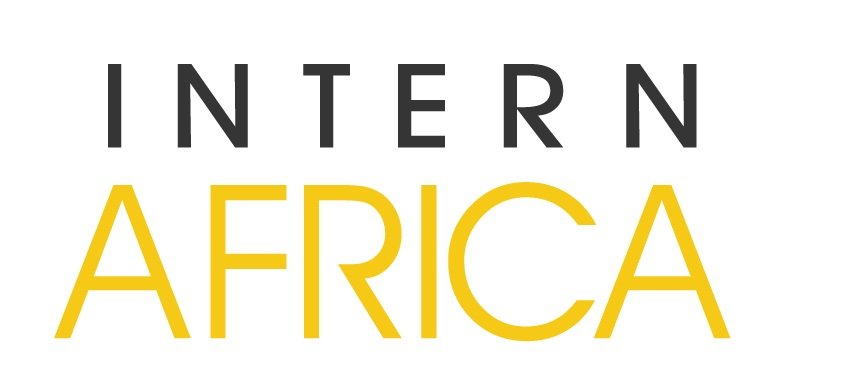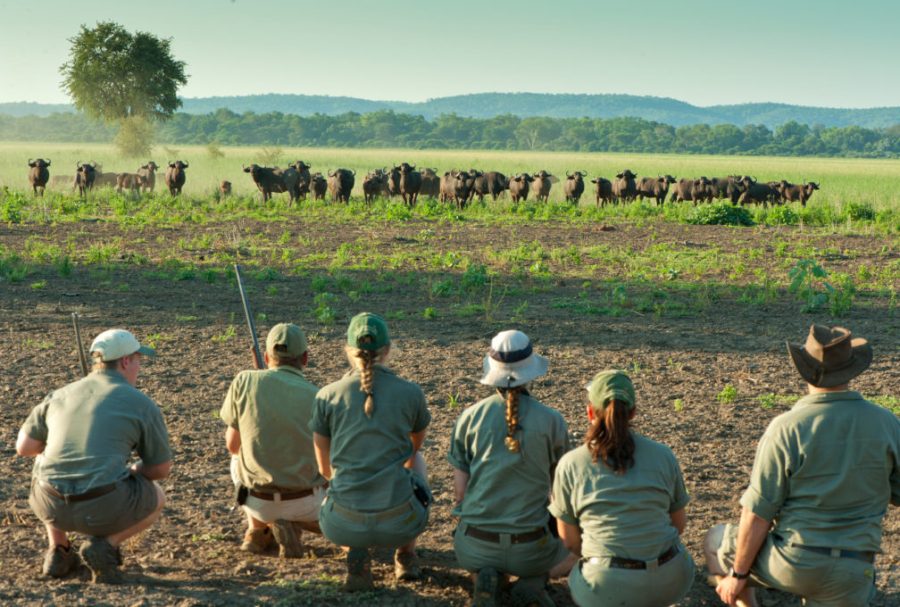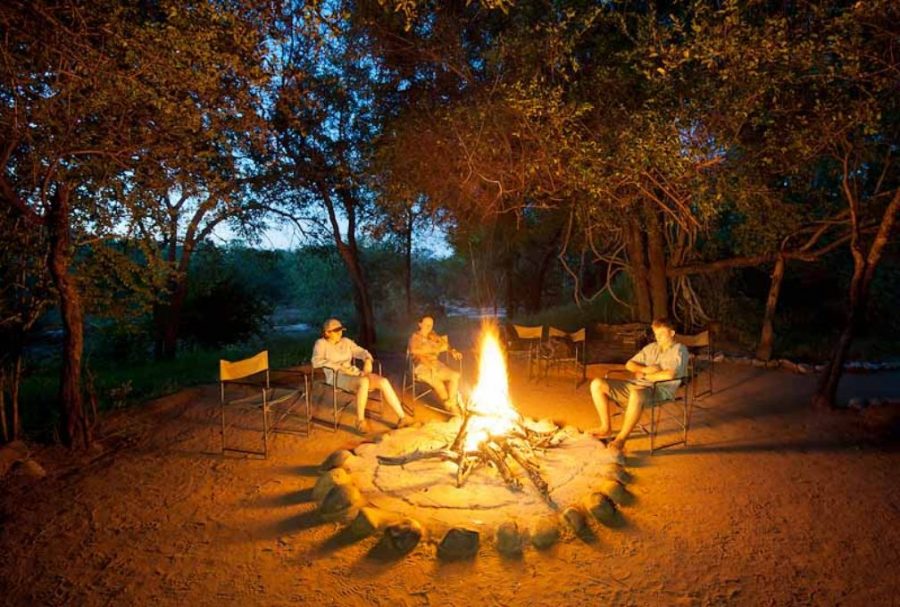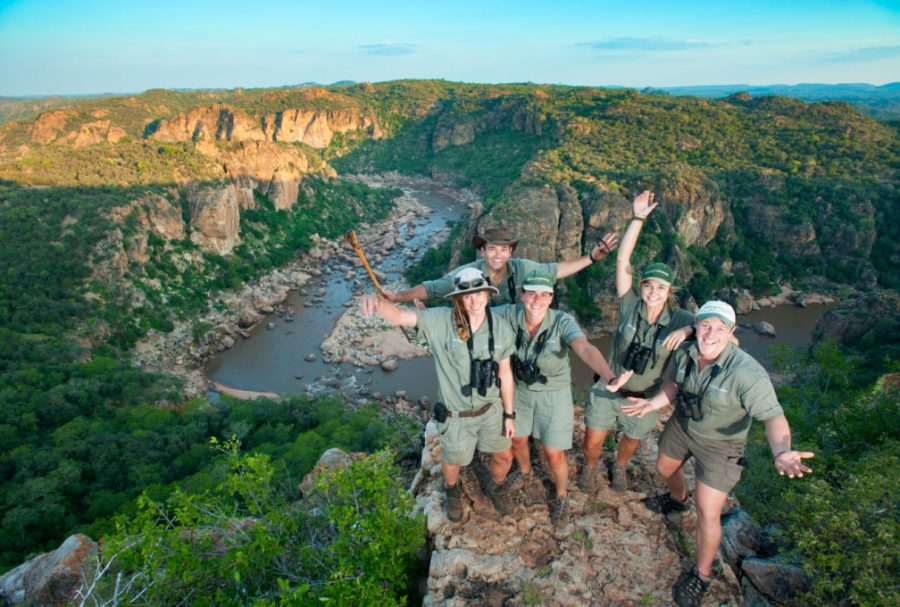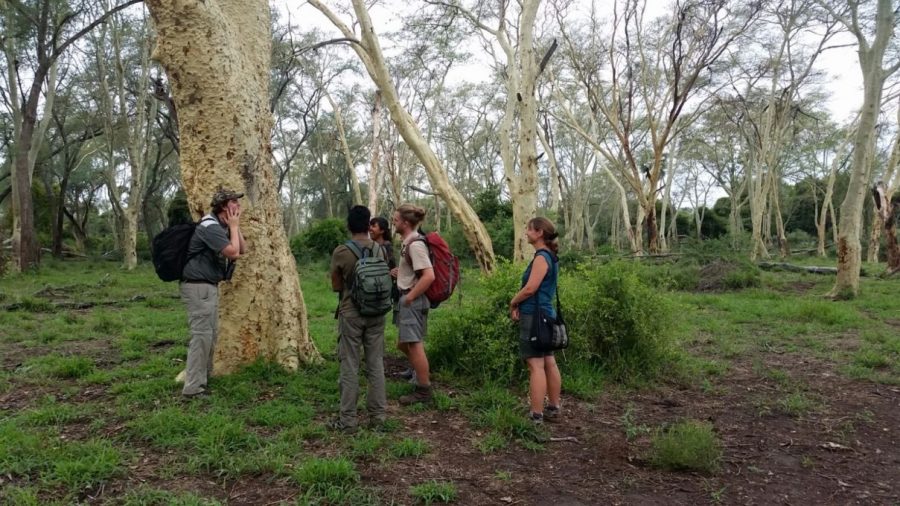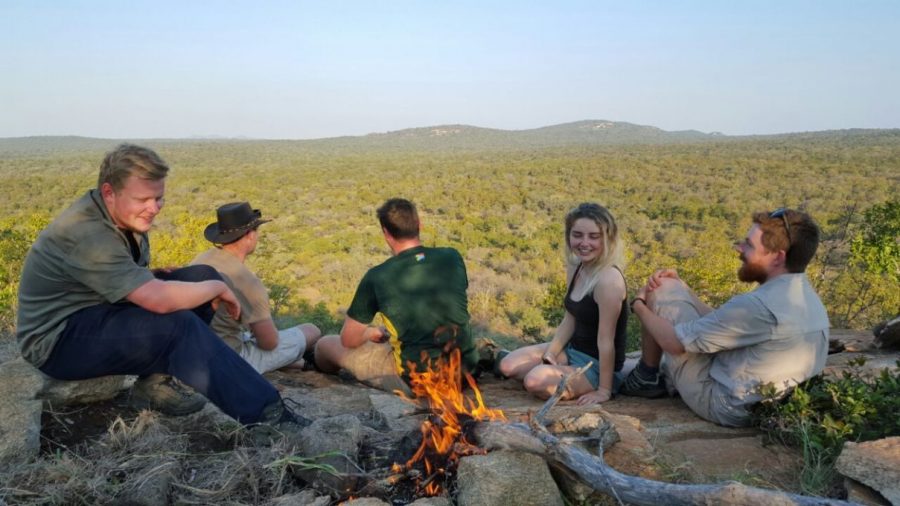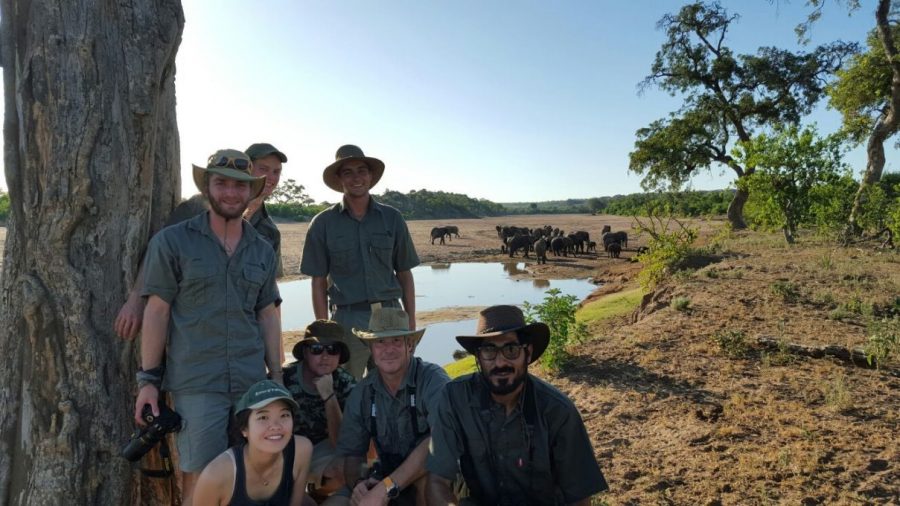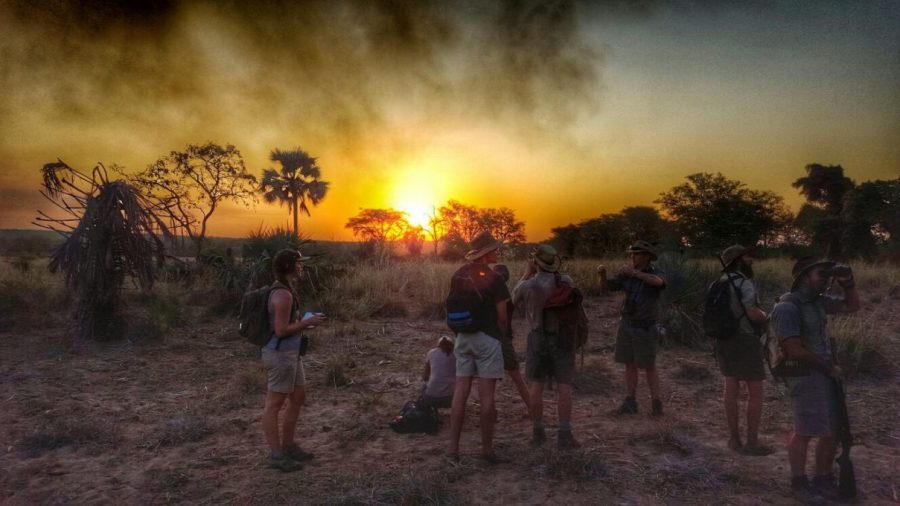- PROFESSIONAL FIELD GUIDE 1 YEAR COURSE
- 55 DAY FIELD GUIDE LEVEL ONE COURSE
- SAFARI GUIDE COURSE 28 DAYS
- ANIMAL TRACKING
- ECOQUEST
- BIRDING IN THE BUSH
THIS PROFESSIONAL FIELD GUIDE COURSE IS FOR YOU, IF:
WHY DO THE COURSE?
This comprehensive and unique course has been designed to supply the safari industry with high caliber FGASA qualified field guides. This course is however not only available to people wishing to enter the industry as field guides, but for anyone who wants to increase their knowledge of the African bush.
If you love the idea of taking safari lodge guests from all over the world out on walking and game drive safaris into Africa’s wild places, finding wildlife for them, and teaching them fascinating facts about the animals and ecosystems or if you are looking for a GAP YEAR learning experience then this Professional Field Guide course is for you.
It also offers a uniquely well-rounded gap year combining facets from accredited environmental education, to a depth and breadth of life skills, to adventure and inspiration - all rolled out in our camps in Africa's wilderness.
Whether you imagine yourself to be a game ranger - managing a conservation and wildlife game reserve, or a forest ranger working in a protected park in your country, or a safari guide giving your guests an interpretative game drive, a course of this depth of experience and learning will give you the footing you need for these inspirational careers.
This course is comprised of approximately 4 - 5 months of theoretical and practical training with our highly qualified instructors, in which you will complete various separate certificate courses. Following this is a lodge placement period of between 5-6 months, which will make up the second half of your course. We will place you at a lodge where you will work with experienced guides and lodge managers, where they have agreed to mentor you and develop your newly acquired skills. At the end of the course you will not only be qualified but will have also gained substantial working and practical experience.
WHY DO THE COURSE?
Some subjects covered on the course:
ZAR 357 100
Dates
02 August 2022 - 02 July 2023
02 September 2022 - 06 August 2023
01 October 2022 - 03 September 2022
- you want to increase your knowledge on the african bush and wildlife or;
- you always dreamed of becoming a (safari) field guide/game ranger or;
- you are looking for a gap year experience or;
- you want to manage a conservation and wildlife game reserve or;
- you want to become a forest ranger working in a protected park in your country
WHY DO THE COURSE?
This comprehensive and unique course has been designed to supply the safari industry with high caliber FGASA qualified field guides. This course is however not only available to people wishing to enter the industry as field guides, but for anyone who wants to increase their knowledge of the African bush.
If you love the idea of taking safari lodge guests from all over the world out on walking and game drive safaris into Africa’s wild places, finding wildlife for them, and teaching them fascinating facts about the animals and ecosystems or if you are looking for a GAP YEAR learning experience then this Professional Field Guide course is for you.
It also offers a uniquely well-rounded gap year combining facets from accredited environmental education, to a depth and breadth of life skills, to adventure and inspiration - all rolled out in our camps in Africa's wilderness.
Whether you imagine yourself to be a game ranger - managing a conservation and wildlife game reserve, or a forest ranger working in a protected park in your country, or a safari guide giving your guests an interpretative game drive, a course of this depth of experience and learning will give you the footing you need for these inspirational careers.
This course is comprised of approximately 4 - 5 months of theoretical and practical training with our highly qualified instructors, in which you will complete various separate certificate courses. Following this is a lodge placement period of between 5-6 months, which will make up the second half of your course. We will place you at a lodge where you will work with experienced guides and lodge managers, where they have agreed to mentor you and develop your newly acquired skills. At the end of the course you will not only be qualified but will have also gained substantial working and practical experience.
WHY DO THE COURSE?
Some subjects covered on the course:
- The Introduction to Guiding in the Natural Environment
- Basic Bush and Survival Skills
- Geology
- Basic Ecology
- Basic Taxonomy
- Mammals
- Reptiles
- Fish
- Birds
- Animal Behavior
- Tracks and Tracking
- Approaching Dangerous Game Animals
- Off-Road and 4x4 Driving
- Night Drives
ZAR 357 100
Dates
02 August 2022 - 02 July 2023
02 September 2022 - 06 August 2023
01 October 2022 - 03 September 2022
THIS 55 DAY FIELD GUIDE LEVEL ONE COURSE IS FOR YOU, IF:
WHY DO THE COURSE?
Although this course forms the foundation for a career in field guiding (and many other wildlife orientated careers), many participants enroll onto this course for a gap year experience or extended bush holiday. Participants older than 18 years, holding a valid driver's license and from all walks of life are invited to attend.
The course offers a solid base of knowledge and practical skills for careers across the world in the environmental and wildlife sectors. Forest or park rangers in America would be able to apply the universal principals of ecology, ecosystems, animal behaviour; astronomy, guest interaction; conservation principals and more, as would wildlife and park rangers in Germany or Britain.
For a gap year, you would walk away with a unique wealth of knowledge that will remain with you for life. Every time you enter a natural environment anywhere in the world, you will understand its fascinating web of life, be able to identify species and feel that much more connected to nature. Add to that the wonderful friendships and bonds made by living with like-minded people from South Africa and all over the world, sharing a close-knit camp and experiencing the adrenaline and peace that comes with the wild.
First aid course – this must preferably be done before coming on the course, but you can also do it after the course. This can be done at any accredited institution in any country. First Aid is generic worldwide. FGASA will only issue your FGASA level 1 certificate if you have valid first aid qualification!
SOME SUBJECTS COVERED ON COURSE
ZAR 116 600
Dates
08 February - 03 April (Makuleke, Mashatu & Selati)
12 March - 05 May (Mashatu & Selati)
10 April - 03 June (Pridelands & Karongwe)
11 May - 04 July (Selati & Pridelands)
10 June - 03 August (Selati & Karongwe)
04 July – 27 August (Pridelands & Selati)
27 October – 20 December (Pongola & Karongwe)
- you want to increase your knowledge on the african bush and wildlife or;
- you intend on becoming a field guide
- you are looking for a gap year experience or;
- you pursue a career within the wildlife industry;
WHY DO THE COURSE?
Although this course forms the foundation for a career in field guiding (and many other wildlife orientated careers), many participants enroll onto this course for a gap year experience or extended bush holiday. Participants older than 18 years, holding a valid driver's license and from all walks of life are invited to attend.
The course offers a solid base of knowledge and practical skills for careers across the world in the environmental and wildlife sectors. Forest or park rangers in America would be able to apply the universal principals of ecology, ecosystems, animal behaviour; astronomy, guest interaction; conservation principals and more, as would wildlife and park rangers in Germany or Britain.
For a gap year, you would walk away with a unique wealth of knowledge that will remain with you for life. Every time you enter a natural environment anywhere in the world, you will understand its fascinating web of life, be able to identify species and feel that much more connected to nature. Add to that the wonderful friendships and bonds made by living with like-minded people from South Africa and all over the world, sharing a close-knit camp and experiencing the adrenaline and peace that comes with the wild.
First aid course – this must preferably be done before coming on the course, but you can also do it after the course. This can be done at any accredited institution in any country. First Aid is generic worldwide. FGASA will only issue your FGASA level 1 certificate if you have valid first aid qualification!
SOME SUBJECTS COVERED ON COURSE
- Planning of Game Drives and Walks
- Navigation and Orientation
- Radio Procedures
- Ecology
- Reptiles
- Geology and Soil
- Amphibians
- Fish
- Mammals
- Weather and Climate
- Animal Behavior
- Plant Communities
- Career Opportunities
- Plant Identification and Uses
- Identification and Ecology of Invertebrates
ZAR 116 600
Dates
08 February - 03 April (Makuleke, Mashatu & Selati)
12 March - 05 May (Mashatu & Selati)
10 April - 03 June (Pridelands & Karongwe)
11 May - 04 July (Selati & Pridelands)
10 June - 03 August (Selati & Karongwe)
04 July – 27 August (Pridelands & Selati)
27 October – 20 December (Pongola & Karongwe)
The 28-day Safari Guide training course, aimed at those wishing to experience a bush holiday, while also learning about the environment they are in. A month of living and learning in nature at our wilderness camps (Selati and Karongwe in South Africa, and Mashatu in Botswana) will provide you with the practical and theoretical knowledge of the natural environment.
WHY DO THE COURSE?
The basis of this course was first developed in 1993 and was the first of its kind in the safari industry. It is for those who are passionate about nature, and who would like a more in-depth experience and understanding of it.
What is covered?
Rates
76950 ZAR
Dates
08 May - 04 June (Mashatu)
02 September - 29 September (Botswana)
02 July - 29 July (Wild & Tuli & Mashatu)
WHY DO THE COURSE?
The basis of this course was first developed in 1993 and was the first of its kind in the safari industry. It is for those who are passionate about nature, and who would like a more in-depth experience and understanding of it.
What is covered?
- Ecology, geology and soils
- Trees/Vegetation Identification
- Birds
- Tracks and tracking
- Mammals
- Guiding Skills (including vehicles and radio procedures)
- Arthropods
- Reptiles and Amphibians
- Astronomy
- Climate and Sleep-out
- Bushcraft
- Fish and Taxonomy
- Grasses
- Habitat Management
- Historical Human Habitation
- Basic Fire Arm Theory and Practical Shoot/Study Day (depending on camp)
Rates
76950 ZAR
Dates
08 May - 04 June (Mashatu)
02 September - 29 September (Botswana)
02 July - 29 July (Wild & Tuli & Mashatu)
EcoTracker offers you the ultimate wilderness immersion. Through the ancient art and science of animal tracking – possibly the world's oldest – you will connect with the iconic places and wildlife of Africa on foot.
WHY DO THE COURSE?
The seven- and 14-day courses take place in remote wilderness areas of Botswana and South Africa. EcoTracker will engross you in all aspects of tracking wild animals: track and sign identification, trailing and survival techniques of wildlife. The courses are mostly hosted by engaging and expert Shangaan trackers.
In many parts of Africa, the ancient survival skills of tracking wild animals have disappeared at an alarming rate – alarming because without these skills, humanity's connection to the Earth is significantly reduced. The time-worn skills of animal tracking taught human beings to live consciously with an appreciation and respect for the natural world. With urbanisation and technology, much of this profound ecological intelligence is being lost at a time when it is most important to our long-term survival.
EcoTracker aims to contribute to the preservation of indigenous wilderness skills and the conservation of the Earth's last wild places. Our instructors are certified by the acclaimed Tracker Academy – the first and only accredited tracker training school in South Africa. Visitors to EcoTracker will get a taste of this knowledge from Shangaan trackers who have dedicated themselves to mastering the skills of traditional hunter-gatherers.
WHAT IS TRACKING?
There are two major aspects to tracking of wildlife – track and sign interpretation, and trailing (following animal trails). EcoTracker includes hunter-gatherer techniques as part of the course. All aspects of tracking take years to master.
Track and sign interpretation – this component of animal tracking looks at the signs left by invertebrates, amphibians, birds, reptiles and mammals. All learning takes place in the field using field guides, photographs and presentations to supplement practical training.
Trailing – this component involves following tracks to find the animal. Mastering trailing takes years, and this aspect of the course requires a relatively high level of fitness and an ability to focus mentally. EcoTracker's instructors are among the best animal trailers in South Africa, and we pride ourselves on our ability to teach this complex skill.
Students will have the opportunity to practise trailing wild animals themselves – under the watchful eye of an EcoTracker instructor. Interpreting mammal and bird alarm calls, animal behaviour and assessing the age of tracks form part of the trailing skill set.
Hunter-gatherer techniques – Southern Africa's indigenous peoples survived off the land for centuries. EcoTracker's instructors will teach you how to build traps using only natural materials, show you how to find birds' nests, water and edible fruits. Through sharing of their experiences growing up in the wilderness, the instructors will immerse students in the wild.
COURSE INFORMATION
7-day course:
This course is designed to give the student a basic understanding of track and sign interpretation. The assessment at the end of the course is endorsed by FGASA for those who wish to try and achieve certification. Depending on the seasonal movement of animals in the area, students may be afforded the opportunity to follow or trail animals on foot.
14-day course:
The longer course gives students the opportunity for a more comprehensive understanding of track and sign interpretation, trailing and hunter-gatherer techniques. The core focus of this course is to spend time trailing animals such as rhino, elephant, buffalo and lion on foot (often dependent on seasonal animal movements). At the end of the course, students can choose to do a fully accredited FGASA trailing and track and sign course.
The course will begin with the track and sign interpretation component, where trainers will teach you how to correctly analyse an animal’s track. Visual presentations, using photographs and illustrations, are also employed to assist with the learning process.
The second component of the course deals with the ability to follow or "trail" an animal’s track, until the tracker finds it. Trailing skills are more complex, and therefore take much longer, to master.
Learners will get to experience the trailing skills first-hand from our Shangaan trainers, who are some of the top trackers in South Africa. Once comfortable the learners will have the opportunity to practise trailing an animal themselves, under the tutelage of the trainers.
Rates
7-day - ZAR 21500
Dates
7 days
02 March - 08 March (Makuleke)
04 April - 10 April (Makuleke)
WHY DO THE COURSE?
The seven- and 14-day courses take place in remote wilderness areas of Botswana and South Africa. EcoTracker will engross you in all aspects of tracking wild animals: track and sign identification, trailing and survival techniques of wildlife. The courses are mostly hosted by engaging and expert Shangaan trackers.
In many parts of Africa, the ancient survival skills of tracking wild animals have disappeared at an alarming rate – alarming because without these skills, humanity's connection to the Earth is significantly reduced. The time-worn skills of animal tracking taught human beings to live consciously with an appreciation and respect for the natural world. With urbanisation and technology, much of this profound ecological intelligence is being lost at a time when it is most important to our long-term survival.
EcoTracker aims to contribute to the preservation of indigenous wilderness skills and the conservation of the Earth's last wild places. Our instructors are certified by the acclaimed Tracker Academy – the first and only accredited tracker training school in South Africa. Visitors to EcoTracker will get a taste of this knowledge from Shangaan trackers who have dedicated themselves to mastering the skills of traditional hunter-gatherers.
WHAT IS TRACKING?
There are two major aspects to tracking of wildlife – track and sign interpretation, and trailing (following animal trails). EcoTracker includes hunter-gatherer techniques as part of the course. All aspects of tracking take years to master.
Track and sign interpretation – this component of animal tracking looks at the signs left by invertebrates, amphibians, birds, reptiles and mammals. All learning takes place in the field using field guides, photographs and presentations to supplement practical training.
Trailing – this component involves following tracks to find the animal. Mastering trailing takes years, and this aspect of the course requires a relatively high level of fitness and an ability to focus mentally. EcoTracker's instructors are among the best animal trailers in South Africa, and we pride ourselves on our ability to teach this complex skill.
Students will have the opportunity to practise trailing wild animals themselves – under the watchful eye of an EcoTracker instructor. Interpreting mammal and bird alarm calls, animal behaviour and assessing the age of tracks form part of the trailing skill set.
Hunter-gatherer techniques – Southern Africa's indigenous peoples survived off the land for centuries. EcoTracker's instructors will teach you how to build traps using only natural materials, show you how to find birds' nests, water and edible fruits. Through sharing of their experiences growing up in the wilderness, the instructors will immerse students in the wild.
COURSE INFORMATION
7-day course:
This course is designed to give the student a basic understanding of track and sign interpretation. The assessment at the end of the course is endorsed by FGASA for those who wish to try and achieve certification. Depending on the seasonal movement of animals in the area, students may be afforded the opportunity to follow or trail animals on foot.
14-day course:
The longer course gives students the opportunity for a more comprehensive understanding of track and sign interpretation, trailing and hunter-gatherer techniques. The core focus of this course is to spend time trailing animals such as rhino, elephant, buffalo and lion on foot (often dependent on seasonal animal movements). At the end of the course, students can choose to do a fully accredited FGASA trailing and track and sign course.
The course will begin with the track and sign interpretation component, where trainers will teach you how to correctly analyse an animal’s track. Visual presentations, using photographs and illustrations, are also employed to assist with the learning process.
The second component of the course deals with the ability to follow or "trail" an animal’s track, until the tracker finds it. Trailing skills are more complex, and therefore take much longer, to master.
Learners will get to experience the trailing skills first-hand from our Shangaan trainers, who are some of the top trackers in South Africa. Once comfortable the learners will have the opportunity to practise trailing an animal themselves, under the tutelage of the trainers.
Rates
7-day - ZAR 21500
Dates
7 days
02 March - 08 March (Makuleke)
04 April - 10 April (Makuleke)
The EcoQuest course (seven or 14 days) is designed to provide a learning experience, and incorporates certain aspects of our Safari Guide course. It is aimed at those who are looking for a more in-depth bush experience, but who do not necessarily have four weeks to break away from work obligations.
WHY DO THE COURSE?
If you are an adventurous spirit wanting to gain a greater understanding of nature and the environment while experiencing the excitement of the bush, then the EcoQuest is for you. Or if you are a student testing the waters for a career in this field, join this course. And on top of it all, we show you how to drive a 4x4 vehicle, to identify birds, plants, trees and tracks, and how to track animals.
The course consists of two components – fascinating facts and knowledge gained about all elements of nature combined with a day in the life of a safari guide experience.
7-day - ZAR 26000
14-day - ZAR 42800
Dates
7 days
08 March 2022 – 14 March (Makuleke)
13 April - 19 April (Mashatu)
14 November - 20 November (Makuleke)
14 days
01 July – 14 July (Makuleke)
21 October – 03 November (Makuleke & Botswana)
24 December 2022 - 06 January 2023 (Makuleke)
WHY DO THE COURSE?
If you are an adventurous spirit wanting to gain a greater understanding of nature and the environment while experiencing the excitement of the bush, then the EcoQuest is for you. Or if you are a student testing the waters for a career in this field, join this course. And on top of it all, we show you how to drive a 4x4 vehicle, to identify birds, plants, trees and tracks, and how to track animals.
The course consists of two components – fascinating facts and knowledge gained about all elements of nature combined with a day in the life of a safari guide experience.
- You will learn about the infinite variety of living organisms that exist in nature.
- Study the behaviour, interaction and identification of the small creatures and birds in our ecosystems.
- Understand the underlying elements that support this variety of life such as geology, soils, plants and climate.
- While you study these smaller organisms, you will study and learn to identify the habits and behaviour of the larger charismatic wild animals that roam our wilderness areas.
- Ecology
- Common trees and shrubs
- Animal tracks and tracking
- Bird identification and behaviour
- Animal behaviour
- Astronomy
- Orientation and navigation
- Bush skills
- Using binoculars correctly and positioning for photography
7-day - ZAR 26000
14-day - ZAR 42800
Dates
7 days
08 March 2022 – 14 March (Makuleke)
13 April - 19 April (Mashatu)
14 November - 20 November (Makuleke)
14 days
01 July – 14 July (Makuleke)
21 October – 03 November (Makuleke & Botswana)
24 December 2022 - 06 January 2023 (Makuleke)
Birding as a hobby has grown tremendously in popularity in the past decade, and these days visitors to the African wilderness areas want to do more than simply spot large game. Owing to this development on the ecotourism front, we have developed our seven-day Birding in the Bush course.
WHY DO THE COURSE?
You don’t have to be a “twitcher” to attend. The course caters to those who wish to learn the basics of bird identification or improve their existing identification skills. Although there are some lectures, it is very much a practical course, with hours spent out in the field to learn how to successfully identify birds by sight and sound.
We are confident that any person attending the course will leave enriched, and with greater confidence in being able to pass on the wonders and beauty of South African birdlife to family, friends or clients.
SUBJECTS
ZAR 21900
You will be based a camp in prime wildlife areas, and partake in wilderness walks or game drives twice a day. No other training provider can match the pristine environment in which we train the frequency of practical activities that are offered.
Dates
24 February - 02 March (Makuleke)
WHY DO THE COURSE?
You don’t have to be a “twitcher” to attend. The course caters to those who wish to learn the basics of bird identification or improve their existing identification skills. Although there are some lectures, it is very much a practical course, with hours spent out in the field to learn how to successfully identify birds by sight and sound.
We are confident that any person attending the course will leave enriched, and with greater confidence in being able to pass on the wonders and beauty of South African birdlife to family, friends or clients.
SUBJECTS
- Evolution
- Anatomy and physiology
- Habitats and environments
- Bird identification
- Bird behaviour
- Ethics
ZAR 21900
You will be based a camp in prime wildlife areas, and partake in wilderness walks or game drives twice a day. No other training provider can match the pristine environment in which we train the frequency of practical activities that are offered.
Dates
24 February - 02 March (Makuleke)
1Why become a Safari Field Guide?
Why become a Safari Guide?
Your office will be the African bushveld, your meetings will consist of encounters with animals. Your job description is an interesting one of many valuable roles! A guide, teacher, friend, game warden, doctor, storyteller and sometimes even a cook for your guests, each day is never quite the same! And each day in the bush is a surprise as the interactions between animals provide unique experiences that both you and your guests learn from.
Add to this, getting to know interesting people from all over the globe keeps you tuned into the world at large.
A Safari Guide walks and drives guests into the game reserves to interpret, in a hands-on inspirational manner, the large and small elements of the wildlife around them. In doing this, a deep appreciation of nature and conservation is instilled in your guests.
You would be responsible for managing those encounters that cause the adrenaline to pump through your veins, with Africa’s big five on foot or in the vehicle, ensuring your guests enjoy a thrilling closeness to the game yet with the necessary caution taken.
SKILLS you will learn for LIFE!
Safari Guiding as a career requires life skills, not just guiding skills. Development of oneself socially and emotionally occurs naturally from the training through to working as a Safari Guide.
Sitting around the warm flickering flames of a campfire each evening, savouring the smell of wood smoke, forming friendships with guests and guides alike. Your guests have great expectations of their brief interval in Africa’s wilderness. You hold in your hands the realisation of their dreams of Africa’s wild.
A field guiding career is about the genuine enjoyment of people and an appreciation of and dedication to, all the many faces nature has to offer us. It is indeed a privileged occupation!
Your office will be the African bushveld, your meetings will consist of encounters with animals. Your job description is an interesting one of many valuable roles! A guide, teacher, friend, game warden, doctor, storyteller and sometimes even a cook for your guests, each day is never quite the same! And each day in the bush is a surprise as the interactions between animals provide unique experiences that both you and your guests learn from.
Add to this, getting to know interesting people from all over the globe keeps you tuned into the world at large.
A Safari Guide walks and drives guests into the game reserves to interpret, in a hands-on inspirational manner, the large and small elements of the wildlife around them. In doing this, a deep appreciation of nature and conservation is instilled in your guests.
You would be responsible for managing those encounters that cause the adrenaline to pump through your veins, with Africa’s big five on foot or in the vehicle, ensuring your guests enjoy a thrilling closeness to the game yet with the necessary caution taken.
SKILLS you will learn for LIFE!
Safari Guiding as a career requires life skills, not just guiding skills. Development of oneself socially and emotionally occurs naturally from the training through to working as a Safari Guide.
- Sensitivity - always be sensitive to the animals, the environment and to your guests.
- Standards - continually strive to better oneself and your company. You are the best ambassador for the ecotourism industry. Don’t let a slip of standards spoil a guest’s experience.
- A subtle and diplomatic approach is required at all times. This approach allows you to deal with conflicts successfully and endears you to your guests.
- Be sincere in everything that you do. Be true to yourself and maintain an honest approach.
- Spirit - always be enthusiastic in everything you do. Try new things with your guests like sleep-outs in the bush or a late night safari. Always go the extra mile to make their experience more meaningful and fun.
- Selflessness – remember that your guests are paying for this experience so create the experience around the guest’s needs. Always be punctual.
- Silence – break your game drives regularly, particularly at night, to allow your guests to sit in silence and absorb the sounds of the bush. Sitting quietly in their own thoughts during the drive will revive them
Sitting around the warm flickering flames of a campfire each evening, savouring the smell of wood smoke, forming friendships with guests and guides alike. Your guests have great expectations of their brief interval in Africa’s wilderness. You hold in your hands the realisation of their dreams of Africa’s wild.
A field guiding career is about the genuine enjoyment of people and an appreciation of and dedication to, all the many faces nature has to offer us. It is indeed a privileged occupation!
2Why a gap year in the African wilderness?
Meaningful, educational, inspirational. Re-defining oneself! Make your gap year count and grow you as a person in so many ways. Make it a gap year you will remember for the rest of your life.
Gap years are about growing as a person and experiencing as much as possible in order to help you decide how you are going to spend the next few years of your young life. They are less about chilling out on beaches and enjoying a year-long party, and more about having a life-changing experience before you embark on your career studies.
A gap year offers an opportunity and alternative to ‘figure things out’ for school leavers not 100% convinced of their career or study plans or direction for their life ahead. With so many career choices available these days, it can indeed be a tough decision to choose one's career.
During a gap year, whatever they choose to do during this time, school leavers may come across a career opportunity they didn’t consider before and that opens up a whole new world. Or it can purely be seen as a time to take a year off, a breather of sorts, a time of personal growth and development that is valuable to any individual.
A unique gap year experience can be the one year Professional Field/Safari Guide course for people either serious about pursuing a career in field guiding or those looking for an educational and meaningful gap year. For one year you will be exposed to diverse ecological and geological terrains, landscapes, wildlife species and so much more at our wilderness camps in remote places such as the Kruger Park, Karongwe Reserve, Selati Reserve and Mashatu Game Reserve (Botswana).
Even better is that for this year of adventure, environmental education and conservation, you walk away with national accreditation by CATHSSETA, endorsement by the Field Guide Association of southern Africa, and 5 months of work experience at a safari lodge. You get an internship where you will meet international guests; fellow lodge and guide staff and gain a heap of essential life and work skills.
The second shorter option for a multi-destination gap year is to join a 55 day Field Guide Level 1 course which provides the fundamentals on safari guiding, conservation and adventure in nature. Certified and endorsed, it enables one to fully experience and learn what it takes to be a Safari Guide in about two months and offers stimulating variety to your gap year itinerary.
The unfenced bush camps provide a consistently stimulating environment in which to learn, supported by the highly qualified and experienced instructors, each with their own unique way of training and guiding that will enhance your overall training experience.
Our advice to a school leaver wanting to take a gap year?
Give yourself the chance to do something rewarding, try out new things and discover what this world has to offer. It will help you become more mature and confident in having to deal with the demands of the ‘adult’ world. If you apply yourself correctly, you can make a gap year experience work for you for a long time as it shows future employers that you are willing to open yourself up to new experiences.
What skills can you gain from taking a gap year?
Whatever one chooses to do during a gap year, the skills gained can be applied to everyday life. Volunteering, for example, gives you the opportunity to help people. The knowledge gained during this time can be used to make a difference in leading your day-to-day life, dealing with people, certain situations and handling yourself under pressure. Having a greater appreciation for life in general is definitely an advantage that will stand you in good stead.
Gap years are about growing as a person and experiencing as much as possible in order to help you decide how you are going to spend the next few years of your young life. They are less about chilling out on beaches and enjoying a year-long party, and more about having a life-changing experience before you embark on your career studies.
A gap year offers an opportunity and alternative to ‘figure things out’ for school leavers not 100% convinced of their career or study plans or direction for their life ahead. With so many career choices available these days, it can indeed be a tough decision to choose one's career.
During a gap year, whatever they choose to do during this time, school leavers may come across a career opportunity they didn’t consider before and that opens up a whole new world. Or it can purely be seen as a time to take a year off, a breather of sorts, a time of personal growth and development that is valuable to any individual.
A unique gap year experience can be the one year Professional Field/Safari Guide course for people either serious about pursuing a career in field guiding or those looking for an educational and meaningful gap year. For one year you will be exposed to diverse ecological and geological terrains, landscapes, wildlife species and so much more at our wilderness camps in remote places such as the Kruger Park, Karongwe Reserve, Selati Reserve and Mashatu Game Reserve (Botswana).
Even better is that for this year of adventure, environmental education and conservation, you walk away with national accreditation by CATHSSETA, endorsement by the Field Guide Association of southern Africa, and 5 months of work experience at a safari lodge. You get an internship where you will meet international guests; fellow lodge and guide staff and gain a heap of essential life and work skills.
The second shorter option for a multi-destination gap year is to join a 55 day Field Guide Level 1 course which provides the fundamentals on safari guiding, conservation and adventure in nature. Certified and endorsed, it enables one to fully experience and learn what it takes to be a Safari Guide in about two months and offers stimulating variety to your gap year itinerary.
The unfenced bush camps provide a consistently stimulating environment in which to learn, supported by the highly qualified and experienced instructors, each with their own unique way of training and guiding that will enhance your overall training experience.
Our advice to a school leaver wanting to take a gap year?
Give yourself the chance to do something rewarding, try out new things and discover what this world has to offer. It will help you become more mature and confident in having to deal with the demands of the ‘adult’ world. If you apply yourself correctly, you can make a gap year experience work for you for a long time as it shows future employers that you are willing to open yourself up to new experiences.
What skills can you gain from taking a gap year?
Whatever one chooses to do during a gap year, the skills gained can be applied to everyday life. Volunteering, for example, gives you the opportunity to help people. The knowledge gained during this time can be used to make a difference in leading your day-to-day life, dealing with people, certain situations and handling yourself under pressure. Having a greater appreciation for life in general is definitely an advantage that will stand you in good stead.
3Game Ranger Vs. Safari Field Guide
People often confuse the terms "game ranger" and "field guide". There is a difference, and here is why …
A game ranger is mainly responsible for the physical and resource management of national parks and private game reserves. S/he acts as a custodian of the wildlife and maintains the game reserve on which the wildlife is kept – the biological populations of the animals as well as roads, fencing, water resources, erosion control, alien plant control, burning programmes, population control and bush clearing, among other tasks.
A field guide interacts with the tourists visiting national parks and private game reserves, sharing his/her knowledge about nature and the environment with these visitors. These guiding experiences are either conducted in a vehicle or on foot. A field guide acts as an interpreter between the environment and the guest, with the ultimate intention of promoting conservation and environmental protection to the tourists through instilling an appreciation for nature in them.
"Nature guide" is a synonym for "field guide" – it refers to exactly the same concept.
A game ranger is mainly responsible for the physical and resource management of national parks and private game reserves. S/he acts as a custodian of the wildlife and maintains the game reserve on which the wildlife is kept – the biological populations of the animals as well as roads, fencing, water resources, erosion control, alien plant control, burning programmes, population control and bush clearing, among other tasks.
A field guide interacts with the tourists visiting national parks and private game reserves, sharing his/her knowledge about nature and the environment with these visitors. These guiding experiences are either conducted in a vehicle or on foot. A field guide acts as an interpreter between the environment and the guest, with the ultimate intention of promoting conservation and environmental protection to the tourists through instilling an appreciation for nature in them.
"Nature guide" is a synonym for "field guide" – it refers to exactly the same concept.
